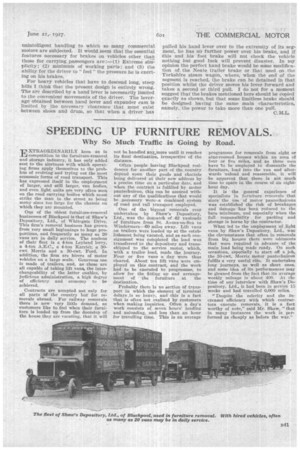SPEEDING UP FURNITURE REMOVALS.
Page 67

If you've noticed an error in this article please click here to report it so we can fix it.
Why So Much Traffic is Going by Road.
XTRAORDINARILY keen as is V4 competition in the furniture-removal and storage industry, it has only added zest to the alertness with which operating firms apply themselves to the problem of evolving and trying out the most economic forms of road transport. This has expressed itself in the employment of larger, and still larger, van bodies, and even light units are very often seen on the road carrying bodies which must strike the man in the street as being many sizes too large for the chassis on which they are mounted.
One of the oldest furniture-removal businesses of Blackpool is that of Shaw's Depository, Ltd., of Whitegate Drive. This firm's removal business has grown from very small beginnings to huge proportions, and frequently as many as 20 vans are in daily service. The nucleus of their fleet is a 4-ton Leyland lorry, a 4-ton A.E.C., a 4-ton Karrier, a 30cwt. Morris and a 30-cwt. Ford. In addition, the firm are hirers of motor vehicles on a large scale. Generous use is made of trailers, and, as these are all capable of taking lift vans, the interchangeability of the latter enables, by judicious administration, a high degree of efficiency and economy to be achieved.
Contracts are accepted not only for all parts of the country but for removals abroad. For railway removals there is now very little demand, as customers like to feel when their furniture is loaded up from the doorstep of the house they are vacating, that it will not be handled anymore until it reaches its final destination, irrespective of the distance.
Often people leaving Blackpool, residences for another part of the country depend upon their goods and chattels being delivered at their new address by a precise time on a particular date, and when the contract is fulfilled by motor pantechnicon, this can be assured without any of the qualifications that would be necessary were a combined system of road and rail transport employed.
One of the biggest removals ever undertaken by Shaw's Depository, Ltd., was the despatch of .42 vauloads of furniture from St. Annes-on-Sea to Windermere-60 miles away. Lift vans on trailers were loaded up at the establishment being vacated, and as each consignment was completed the load was transferred to the depository and transshipped to the service motor, which, with a trailer load, made the journey. Four or five vans a day were thus cleared. About ten lift vans were employed on this contract, and the work had to be executed to programme, to allow for the fitting up and arrangement of the furniture at the destination.
Probably there is no section of transport in which the element of terminal delays is so heavy, awl this is a fact that is often not realized by customers when making inquiries. Often a days work consists of seven hours' loading and unloading, and less than an hour for travelling time. This is an average programme for removals from eight or nine-roomed houses within an area of four or five miles, and as three men have to be employed to dismantle the furniture, load into the van and afterwards unload and reassemble, it will be apparent that there is nbt much time to spare in the course of an eighthour day.
It is the general experimme of specialists in furniture removals that since the use of motor pantechnicons was established the risk of breakages and -damage has been reduced to the bare minimum, and especially when the full responsibility for packing and storage is borne by the contractor.
What led to the employment of jight vans by Shaw's Depository, Ltd., was the circumstance that often in removals from big houses there were oddments that were required in advance of the main load being made ready. On such occasions, especially to start off a job, the 30-cwt. Morris motor pantechnicon 'fulfils a very useful rfile. It undertakes long journeys, as well as short ones, and some idea of its performances may be gleaned from the fact that its average weekly mileage is about 400. At the time of our interview with Shaw's Depository, Ltd., it had been in service 15 weeks and had travelled 6,000 miles.
"Despite the celerity and the increased efficiency with which contractors execute removals, it is a fact worthy of note," said Mr. Shaw, "that in many instances the work is performed as cheaply as before the war."




















































































































